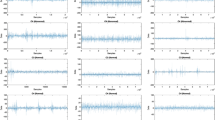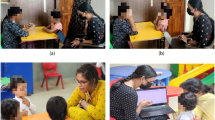Abstract
Early diagnosis of autism spectrum disorder (ASD) plays an important role in the rehabilitation of the patient. This goal necessitates higher-level pattern representation and a strong modeling approach. The proposed approach applies scalogram images of electroencephalography signals for the first purpose and a two-level deep learning architecture for better classification. Scalogram images embed both the temporal and spectral information of the signal. On the other hand, the hybrid deep learning hierarchy of convolutional neural network followed by long short-term memory models both spatial and temporal information of the scalogram image. The approach is evaluated on a dataset of 34 ASD samples and 11 normal cases in without-voice and with-voice conditions. To validate the early diagnosis hypothesis, signals from children older than 5 years are used as the training set, and signals from younger subjects are used as the validation set. The proposed method achieves excellent performance of 99.50% and 98.43% for automatically detecting ASD with and without voice, respectively. This classification performance is higher than most recent reported approaches, and the results show the effectiveness of the approach in early diagnosis of ASD and demonstrate the auditory impact on the diagnosis of autism.
Graphical Abstract




Similar content being viewed by others
References
Zeidan J, Fombonne E, Scorah J, Ibrahim A, Durkin MS, Saxena S, Yusuf A, Shih A, Elsabbagh M (2022) Global prevalence of autism: a systematic review update. Autism Res 15(5):778–790. https://doi.org/10.1002/aur.2696
Light GA, Williams LE, Minow F, Sprock J, Rissling A, Sharp R, Swerdlow NR, Braff DL (2010) Electroencephalography (EEG) and event-related potentials (ERPs) with human participants. Curr Protoc Neurosci Chapter 6:Unit 6.25.1-24. https://doi.org/10.1002/0471142301.ns0625s52
Das S, Zomorrodi R, Mirjalili M, Kirkovski M, Blumberger DM, Rajji TK, Desarkar P (2023) Machine learning approaches for electroencephalography and magnetoencephalography analyses in autism spectrum disorder: a systematic review. Prog Neuro-Psychopharmacol Biol Psychiatry 123:110705. https://doi.org/10.1016/j.pnpbp.2022.110705
Rezaee K, Khosravi MR, Ghayoumizadeh H, Moghimi MK, Samara G, Attar H, Almatarneh S (2022) Diagnostic tools for detecting autism spectrum disorder: A review. 2022 International Engineering Conference on Electrical, Energy, and Artificial Intelligence (EICEEAI). pp 1–6. https://doi.org/10.1109/EICEEAI56378.2022.10050460
Sheikhani A, Behnam H, Mohammadi MR, Noroozian M (2008) Golabi P (2008) Connectivity analysis of quantitative Electroencephalogram background activity in Autism disorders with short time Fourier transform and Coherence values. In Proceedings of the Congress on Image and Signal Processing, Sanya, China 27–30:207–212. https://doi.org/10.1109/CISP.2008.595
Sheikhani A, Behnam H, Mohammadi MR, Noroozian M, Mohammadi M (2012) Detection of abnormalities for diagnosing of children with autism disorders using of quantitative electroencephalography analysis. J Med Syst 36(2):957–963. https://doi.org/10.1007/s10916-010-9560-6
Cheong LC, Sudirman R, Hussin S (2015) Feature extraction of EEG signal using wavelet transform for autism classification. J Eng Appl Sci 10(19):8533–8540
Sinha T, Munot MV, Sreemathy R (2022) An Efficient approach for detection of autism spectrum disorder using electroencephalography signal. IETE J Res 68(2):824–832. https://doi.org/10.1080/03772063.2019.1622462
Bosl W, Tierney A, Tager-Flusberg H, Nelson C (2011) EEG complexity as a biomarker for autism spectrum disorder risk. BMC Med 9(1):18. https://doi.org/10.1186/1741-7015-9-18
Abdolzadegan D, Moattar MH, Ghoshuni M (2020) A robust method for early diagnosis of autism spectrum disorder from EEG signals based on feature selection and DBSCAN method. Biocybern Biomed Eng 40(1):482–493. https://doi.org/10.1016/j.bbe.2020.01.008
Subudhi AK, Mohanty M, Sahoo SK, Mohanty SK, Mohanty B (2023) Automated delimitation and classification of autistic disorder using EEG signal. IETE J Res 69(2):951–959. https://doi.org/10.1080/03772063.2020.1844076
Tawhid MNA, Siuly S, Wang H (2020) Diagnosis of autism spectrum disorder from EEG using a time–frequency spectrogram image-based approach. Electron Lett 56(25):1372–1375. https://doi.org/10.1049/el.2020.2646
Ahmadlou M, Adeli H, Adeli A (2010) Fractality and a wavelet-chaos-neural network methodology for EEG-based diagnosis of autistic spectrum disorder. J Clin Neurophysiol 27(5):328–333. https://doi.org/10.1097/WNP.0b013e3181f40dc8
Ahmadlou M, Adeli H, Adeli A (2012) Improved visibility graph fractality with application for the diagnosis of autism spectrum disorder. Phys A Stat Mech its Appl 391(20):4720–4726. https://doi.org/10.1016/j.physa.2012.04.025
Djemal R, AlSharabi K, Ibrahim S, Alsuwailem A (2017) EEG-based computer aided diagnosis of autism spectrum disorder using wavelet, entropy, and ANN. Biomed Res Int 2017:1–9. https://doi.org/10.1155/2017/9816591
Jayarathna S, Jayawardana Y, Jaime M, Thapaliya S (2019) Electroencephalogram (EEG) for delineating objective measure of autism spectrum disorder. ArXiv preprint 34–65. arXiv:1907.01515. https://doi.org/10.48550/arXiv.1907.01515
Krizhevsky A, Sutskever I, Hinton GE (2017) ImageNet classification with deep convolutional neural networks. Commun ACM 60(6):84–90. https://doi.org/10.1145/3065386
Szegedy C et al (2015) Going deeper with convolutions. 2015 IEEE Conference on Computer Vision and Pattern Recognition (CVPR). Boston, MA, USA, pp 1–9. https://doi.org/10.1109/CVPR.2015.7298594
Iandola FN, Han S, Moskewicz MW, Ashraf K, Dally WJ, Keutzer K (2016) SqueezeNet: AlexNet-level accuracy with 50x fewer parameters and <0.5MB model size. ArXiv preprint. https://doi.org/10.48550/arXiv.1602.07360
Faust O, Acharya UR, Adeli H, Adeli A (2015) Wavelet-based EEG processing for computer-aided seizure detection and epilepsy diagnosis. Seizure 26:56–64. https://doi.org/10.1016/j.seizure.2015.01.012
Wachowiak MP, Wachowiak-Smolíková R, Johnson MJ, Hay DC, Power KE, Williams-Bell FM (2018) Quantitative feature analysis of continuous analytic wavelet transforms of electrocardiography and electromyography. Philos Trans R Soc A Math Phys Eng Sci 376(2126):20170250. https://doi.org/10.1098/rsta.2017.0250
Salimova KR (2022) Neurophysiological correlates of impaired development in autism spectrum disorder (ASD). Biol Bull Rev 12(2):140–148. https://doi.org/10.1134/S2079086422020074
Deidda G, Bozarth IF, Cancedda L (2014) Modulation of GABAergic transmission in development and neurodevelopmental disorders: investigating physiology and pathology to gain therapeutic perspectives. Front Cell Neurosci 8:119. https://doi.org/10.3389/fncel.2014.00119
Pineda JA (2005) The functional significance of mu rhythms: translating ‘seeing’ and ‘hearing’ into ‘doing.’ Brain Res Rev 50(1):57–68. https://doi.org/10.1016/j.brainresrev.2005.04.005
Schopler E, Reichler RJ, DeVellis RF, Daly K (1980) Toward objective classification of childhood autism childhood autism rating scale (CARS). J Autism Dev Disord 10(1):91–103. https://doi.org/10.1007/BF02408436
Tawhid MNA, Siuly S, Wang H, Whittaker F, Wang K, Zhang Y (2021) A spectrogram image based intelligent technique for automatic detection of autism spectrum disorder from EEG. PLoS ONE 16(6):e0253094. https://doi.org/10.1371/journal.pone.0253094
Pham TH, Vicnesh J, Wei JKE, Oh SL, Arunkumar N, Abdulhay EW, Ciaccio EJ, Acharya UR (2020) Autism spectrum disorder diagnostic system using HOS bispectrum with EEG signals. Int J Environ Res Public Health 17(3):971. https://doi.org/10.3390/ijerph17030971
Oh SL, Jahmunah V, Arunkumar N, Abdulhay EW, Gururajan R, Adib N, Ciaccio EJ, Cheong KH, Acharya UR (2021) A novel automated autism spectrum disorder detection system. Complex Intell Syst 7(5):2399–2413. https://doi.org/10.1007/s40747-021-00408-8
Baygin M, Dogan S, Tuncer T, Barua PD, Faust O, Arunkumar N, Abdulhay EW, Palmer EE, Acharya UR (2021) Automated ASD detection using hybrid deep lightweight features extracted from EEG signals. Comput Biol Med 134:104548. https://doi.org/10.1016/j.compbiomed.2021.104548
Bajestani GS, Behrooz M, Khani AG, Nouri-Baygi M, Mollaei A (2019) Diagnosis of autism spectrum disorder based on complex network features. Comput Methods Programs Biomed 177:277–283. https://doi.org/10.1016/j.cmpb.2019.06.006
Author information
Authors and Affiliations
Corresponding author
Ethics declarations
Conflict of interest
The authors declare no competing interests.
Additional information
Publisher's Note
Springer Nature remains neutral with regard to jurisdictional claims in published maps and institutional affiliations.
Rights and permissions
Springer Nature or its licensor (e.g. a society or other partner) holds exclusive rights to this article under a publishing agreement with the author(s) or other rightsholder(s); author self-archiving of the accepted manuscript version of this article is solely governed by the terms of such publishing agreement and applicable law.
About this article
Cite this article
Abedinzadeh Torghabeh, F., Modaresnia, Y. & Moattar, M.H. Hybrid deep transfer learning-based early diagnosis of autism spectrum disorder using scalogram representation of electroencephalography signals. Med Biol Eng Comput 62, 495–503 (2024). https://doi.org/10.1007/s11517-023-02959-z
Received:
Accepted:
Published:
Issue Date:
DOI: https://doi.org/10.1007/s11517-023-02959-z




